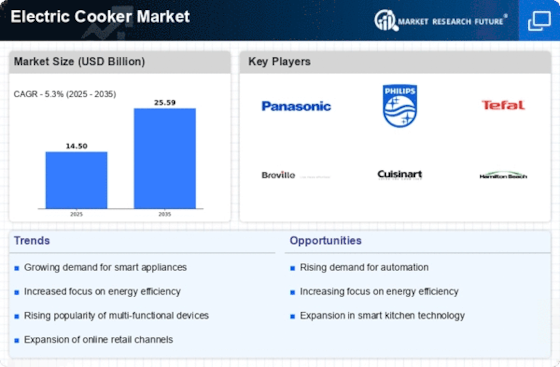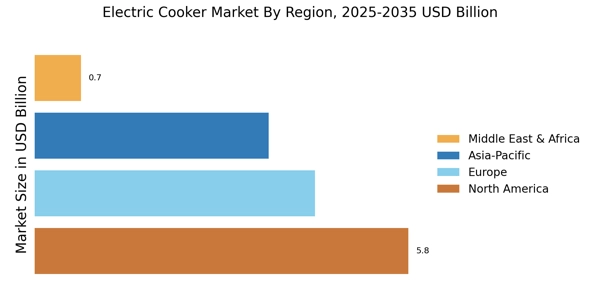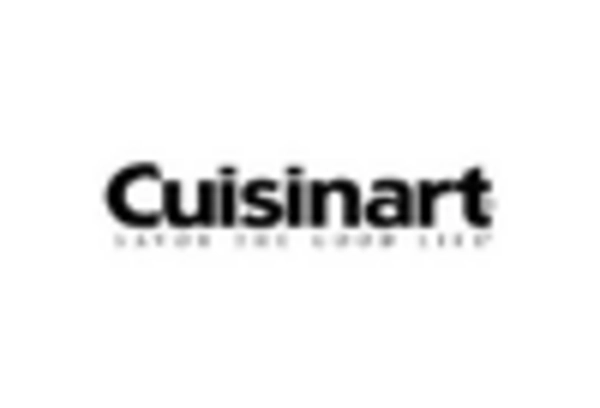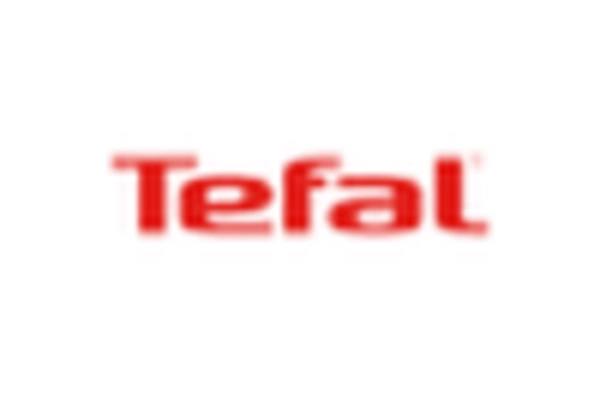Rising Disposable Income and Urbanization
The Electric Cooker Market is positively impacted by rising disposable incomes and urbanization trends. As more individuals move to urban areas and experience increased financial stability, there is a growing willingness to invest in modern kitchen appliances. Electric cookers, which offer convenience and efficiency, are becoming essential in urban households. Recent statistics indicate that urban populations are expected to grow by 25% over the next decade, driving demand for innovative cooking solutions. This demographic shift suggests that the Electric Cooker Market will likely see a robust expansion as urban consumers prioritize quality and functionality in their kitchen appliances. Manufacturers are thus encouraged to tailor their offerings to meet the preferences of this emerging market segment.
Sustainability and Eco-Friendly Practices
Sustainability has emerged as a crucial driver within the Electric Cooker Market. As environmental concerns gain prominence, consumers are increasingly seeking energy-efficient appliances that minimize their carbon footprint. Electric cookers, particularly those designed with energy-saving features, appeal to eco-conscious consumers. Market analysis reveals that energy-efficient electric cookers are projected to grow by 20% in the next five years, reflecting a shift towards sustainable cooking solutions. Manufacturers are responding by developing products that not only reduce energy consumption but also utilize recyclable materials. This focus on sustainability is likely to enhance the reputation of the Electric Cooker Market, attracting a broader customer base that values eco-friendly practices.
Health Consciousness and Nutritional Awareness
The Electric Cooker Market is significantly influenced by the rising health consciousness among consumers. As individuals become more aware of the nutritional value of their meals, there is a growing preference for cooking methods that preserve food quality and nutrients. Electric cookers, which often feature steaming and slow-cooking options, align well with this trend. Market Research Future suggests that approximately 60% of consumers now prioritize health-oriented cooking appliances, leading to an increase in the adoption of electric cookers. This shift not only enhances the appeal of electric cookers but also encourages manufacturers to develop models that emphasize health benefits. Consequently, the Electric Cooker Market is likely to see sustained growth as health-conscious consumers continue to seek appliances that support their dietary goals.
Technological Advancements in Cooking Appliances
Technological advancements play a pivotal role in shaping the Electric Cooker Market. Innovations such as smart connectivity, touch controls, and advanced cooking algorithms enhance the functionality and appeal of electric cookers. The integration of Internet of Things (IoT) technology allows users to control their cookers remotely, providing unprecedented convenience. Recent data indicates that smart electric cookers have captured a significant market share, accounting for nearly 30% of total electric cooker sales. This trend suggests that consumers are increasingly drawn to high-tech appliances that offer enhanced features and capabilities. As manufacturers continue to invest in research and development, the Electric Cooker Market is poised for further growth driven by these technological advancements.
Increasing Demand for Convenient Cooking Solutions
The Electric Cooker Market experiences a notable surge in demand for convenient cooking solutions. As lifestyles become increasingly fast-paced, consumers seek appliances that simplify meal preparation. Electric cookers, with their user-friendly interfaces and programmable features, cater to this need effectively. Market data indicates that the sales of electric cookers have risen by approximately 15% over the past year, reflecting a shift towards appliances that save time and effort. This trend is particularly pronounced among urban dwellers and working professionals who prioritize efficiency in their cooking routines. The Electric Cooker Market is thus positioned to benefit from this growing consumer preference for convenience, as manufacturers innovate to meet the evolving demands of modern households.

















